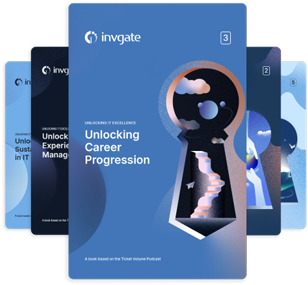Unlocking career development in IT can feel like an exciting adventure, full of opportunities to learn, grow, and connect with others. On the flip side, it can also be overwhelming due to the many possible paths, constantly evolving technologies, and high expectations.
In this article, we're sharing expert advice straight from the pros on how to move forward in the IT world. You'll find practical tips and best practices from our latest Ticket Volume eBook, "Unlocking Career Progression: Keys to Lifelong Learning in IT," to help you whether you're just starting out or aiming to climb the next rung on your career ladder.
Dive in for some valuable insights, and don’t forget to grab our free eBook on career progression and subscribe to Ticket Volume for even more great content!
Table of contents
- Download Free eBook
- What is career development?
- How to pick an IT career path
- 5 tips for career development in IT
- 7 steps to build a career growth plan
Download "Unlocking Career Progression: Keys to Lifelong Learning in IT"
Unlocking Career Progression
Discover the strategies to lifelong learning and evolvement in IT
Download for free
This eBook is part of the “Unlocking IT” series, where we bring together the valuable knowledge different guests have shared on our podcast, Ticket Volume, about various relevant industry topics.
You can find the first installment, "Unlocking Experience Management," here, and the second installment, "Unlocking the Human Element," here.
What is career development?
Career development is all about the journey of learning new things, balancing work and life, and making smart moves to reach your career goals. In IT, this means keeping your technical skills sharp, staying on top of industry trends, and positioning yourself for growth.
You might hear terms like career growth or career progression thrown around — they’re pretty similar but have slight differences. Career growth usually means moving up within your company, while career progression can include a variety of paths, like switching roles or gaining new skills to keep advancing in your career.
How to pick an IT career path
Choosing a career path in IT can be daunting given the vast array of specializations available. Here are some steps to help you get started:
- Assess your interests and strengths: Identify what areas of technology excite you the most and where your skills naturally align.
- Research potential careers: Look into various IT roles such as software development, cybersecurity, data analysis, network administration, and more to understand what each entails.
- Gain relevant education and skills: Pursue formal education through degrees, boot camps, or online courses to build a solid foundation.
- Seek internships and entry-level positions: Gain practical experience through internships or entry-level jobs to apply your knowledge and learn from professionals.
- Network with industry professionals: Join professional organizations, attend industry events, and participate in online forums to build connections and gain insights into different career paths.
5 tips for career development in IT
Either if you are just getting started, or already way into your journey, here are some tips to make sure you are getting the most out of your career projection.
1. Balance theory with practical experience
Education gives you knowledge, but training shows you how to apply it and get real results. In IT, it's not enough to just read books or learn the theory—you need to put that knowledge into practice. This means engaging in hands-on training, participating in simulations, and learning from experienced mentors. By doing this, you avoid the pitfalls of relying solely on theory and gain the practical skills needed to succeed.
|
|
"With education, you learn some knowledge. In training, you learn how to apply that knowledge, and you actually get something done. (...) You can read the ITIL books; that's great, you get the knowledge of what you should be doing. But how do you then practice that? When does the training come in? You're learning some theory and you're thinking, 'How do I apply that?' The best way is learning from doing. Read your ITIL books, look at the standards for IT Service Management like ISO20000, that's all great stuff. But it doesn't teach you how to avoid the mistakes of just following the theory. Get in on some simulations, talk to some smart consultants who can mentor you, who can tell you what they've seen elsewhere.." David Ratcliffe |
2. Develop skills & certifications critically
In today's IT environment, possessing a diverse skill set is essential. The industry demands more than just technical expertise; soft skills like communication, problem-solving, and adaptability are equally important.
Certifications, for instance, can serve as a useful filter, providing quantitative proof of your skills. However, it's crucial to balance certifications with practical experience and the right attitude. This strategic approach ensures you’re not only qualified on paper but also a well-rounded candidate who can make meaningful contributions to an organization.
|
|
"When we really think about it, what we should be thinking about it is from the hirer's perspective. They're trying to get good people. As a hirer, I wanna know if you're a good fit with my organization, I want to know if you're gonna bring good experience. And I don't want to have to interview 25,000 people, because I'm busy. So, if I can use a certification as a filter for that, now I have quantitative proof. You can also have a million certs and no value. We all know that person. But when you realize that you have to have all of it, then you can build your certifications strategically. I'm gonna build a quantitative leg of that stool, but I also need the experience component and the attitude component." Sean McClean |
3. Build and leverage your professional network
Networking is a powerful tool for career progression in IT. Building meaningful connections with colleagues, mentors, and industry peers can open doors to new opportunities, provide valuable insights, and offer support as you navigate your career path.
It’s all about cultivating relationships that offer mutual benefits. Engaging in genuine conversations, finding common ground, and following through on commitments helps you build a robust professional network. This can provide guidance, recommend opportunities, and help you stay informed about industry trends.
|
|
"The way I connect is by having conversations with people. For example, Matt, you and I have talked for probably six or eight months about me being on your show, and we've been like two ships passing in the night, constantly rescheduling. But the bond and connection we've established through just a few conversations in person make all the difference. It makes us want to follow through. I believe in finding commonalities, understanding what makes someone tick, and what can help us connect. To me, that's what life is about: making connections with people and following through." Doug Rabold |
4. Highlight achievements, not just duties
When crafting your IT resume, it's essential to highlight your achievements rather than just listing your job responsibilities. Employers want to see concrete evidence of your contributions and the impact you've made in previous roles. To support that, you might first scan your resume against ATS to check how clearly those achievements show up. By focusing on quantifiable achievements, you demonstrate your ability to deliver results and add value to an organization.
This approach makes your resume stand out and increases your chances of securing interviews. Highlighting achievements shows potential employers that you are results-oriented and capable of driving success.
|
|
"A common mistake is people think it's a biography. It's like, if I don't tell them every single thing I did, then this might not get me the job. Well, the fact is the resume is to get you the interview." Robert Fedoruk Freelance consultant, coach, and speaker Episode 13 of Ticket Volume |
5. Balance technical skills with soft skills
Balancing technical skills with soft skills is vital for career progression in IT. While technical expertise is crucial for performing specific tasks, soft skills like communication, teamwork, adaptability, and problem-solving are essential for effective collaboration and Project Management.
These skills help you work better with others, navigate complex situations, and lead projects successfully. In a competitive job market, strong soft skills can set you apart from other candidates and make you a more attractive hire for employers looking for well-rounded professionals.
|
|
"Communication, teamwork, adaptability, and problem-solving are crucial for IT professionals who need to collaborate across different disciplines and manage complex projects. These types of soft skills are often the differentiators in career progression, helping professionals stand out in a competitive job market." Mathew Burrows |
7 steps to build a career growth plan
When you are looking to make the next step in your career, it can sometimes be a little confusing as to where to start. These seven steps can help you shine some light on this process.
- Set clear goals: Define your short-term and long-term objectives. Having clear goals helps you stay focused and measure your progress.
- Assess your current skills: Evaluate your current skill set and identify areas for improvement. This will help you determine what additional training or experience you need.
- Create a learning plan: Outline a plan to acquire new skills and knowledge. This can include formal education, online courses, certifications, and hands-on projects.
- Network actively: Regularly engage with industry professionals, attend events, and participate in online communities. Networking can provide opportunities and insights that help you grow.
- Seek mentorship: Find mentors who can offer guidance, share their experiences, and provide feedback. Mentorship can help you navigate your career path more effectively.
- Document your achievements: Keep a record of your accomplishments, projects, and the impact you've made in your roles. This documentation will be valuable when updating your resume or preparing for interviews.
- Review and adjust your plan: Regularly review your career growth plan and adjust it as needed based on your progress and any changes in your career goals or the industry.
Final thoughts
Career development in IT is a multifaceted journey that requires continuous learning, skill diversification, strategic networking, and effective communication. These are the main takeaways from this article to help you successfully navigate your career path in IT.
- Embrace lifelong learning to stay relevant and competitive.
- Develop a diverse skill set to tackle complex problems and collaborate effectively.
- Build and leverage your professional network for opportunities and insights.
- Highlight achievements on your resume to demonstrate your impact.
- Balance technical and soft skills to enhance collaboration and leadership abilities.
Remember, career development is an ongoing process. Stay adaptable, remain curious, and continue to seek opportunities for growth. And, don’t forget to download our free eBook for more in-depth insights and subscribe to Ticket Volume for the latest updates and expert advice in the IT industry.















